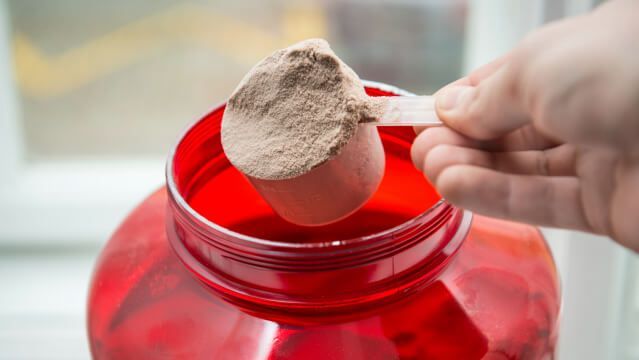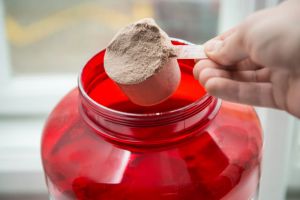
As our world produces and demands more processed foods for convenience, marketers are also getting clever. Foods are being labeled to cater to those with dietary requirements or those looking to get healthy. But in the process, we’re also becoming unhealthier by the minute. This is especially true when it comes to our gut health.
How processed foods affect our gut health
Researchers are now finding that good bacteria in our bodies are largely affected by processed foods and ingredients within certain products that are marketed as safe choices. And, what’s even more fascinating and important is how our good bacteria affects our overall health, including our mood, skin, weight, digestion, inflammation factors, immunity, and even our longevity.
Many of these processed foods are also labeled as healthy, including three of the top offenders below. Here are some choices you might want to avoid for optimal gut health — and what to choose instead.
Whole grain cereals and breads
Whole grain cereal has been a breakfast classic promoted for years, and shelf-stable whole grain bread is one of the most popular foods on the market today. However, take a look at the list of ingredients on most whole-grain products. Even those listed as organic, 100-percent whole grain, and even non-GMO contain added sugars, very processed forms of wheat (gluten), high-glycemic gluten-free grains like rice and corn, yeast, and many also contain preservatives. These lead to gut inflammation, unbalanced blood sugar levels, erratic digestion, and IBS symptoms like gas, bloating, pain and diarrhea.
If you like cereal in the morning, try making a grain-free cereal with shredded coconut, almonds, walnuts and hemp seeds for a protein-rich breakfast that also has good fats for your body. If you’re missing bread, opt for romaine, collard leaves, or try a grain-free bread.
Low-fat snacks
Thankfully, the low-fat craze is coming to an end… finally! However, we’re still not there yet as many nutritionists, doctors, and health experts still believe and report that fats are bad for us. And food producers are taking notice as they continue to pump out diet snack foods labeled low-fat or low-calorie. Yet what consumers aren’t looking at is the ingredients in these low-fat snack products. When the fat is taken away from a food, refined or added sugar is almost always added back in, which disrupts good bacteria and feeds bad bacteria in the body.
If you’d like a truly low-fat snack, don’t pick up something in a box or package, instead choose baby carrots, grape tomatoes, an apple, banana or an orange. These are all naturally low in fat and contain beneficial fiber, vitamins and minerals, which are good for your gut and overall health.
Protein shakes
 Packaged protein shakes offer an easy, on-the-go option that some people rely on during a busy workday. However, these protein shakes often contain excess lactose (milk sugar), casein (a hard-to-digest milk protein) or processed forms of soy such as isolates.
Packaged protein shakes offer an easy, on-the-go option that some people rely on during a busy workday. However, these protein shakes often contain excess lactose (milk sugar), casein (a hard-to-digest milk protein) or processed forms of soy such as isolates.
Many also contain artificial sweeteners and/or added sugars. Not only are lactose and casein very harmful to the gut, but added and refined sugars, along with artificial sweeteners, lower good bacteria in the body and promote the growth of bad bacteria.
Instead of a processed protein shake, make your own at home with some unsweetened almond milk (choose one without carrageenan), coconut milk, chilled green tea, coconut water or plain water. Then add in some hemp protein, or plain organic Greek yogurt, which is easy to digest and contains good bacteria for your gut. Then toss in some berries, spinach, half a banana or green apple, and you’ve got yourself a 100-percent natural, wholesome protein shake that will really do your body some good!
If you’d like to take care of your gut health — without fretting over everything you buy — the easy way is to go with nature’s most wholesome, natural foods every chance you get. These include healthy fats (coconut, avocado, cage-free and organic eggs, olives, raw nuts and seeds), fermented foods (kimchi, kefir and sauerkraut), grass-fed and organic sources of protein, and ample amounts of vegetables, fruits, and greens. If you need something sweet aside from fruit, use small amounts of natural sweeteners, such as honey, coconut sap, or maple syrup.
What are some things you can choose in place of these foods above to improve your gut health this week?
— The Alternative Daily
Sources:
http://onlinelibrary.wiley.com/doi/10.1111/j.1365-2672.2012.05344.x/abstract
http://www.scientificamerican.com/article/how-gut-bacteria-help-make-us-fat-and-thin
http://consumer.healthday.com/gastrointestinal-information-15/digestion-health-news-200/additives-in-processed-foods-may-alter-gut-bacteria-696816.html
http://www.dovepress.com/comparison-with-ancestral-diets-suggests-dense-acellular-carbohydrates-peer-reviewed-article-DMSO-MVP
http://www.thelancet.com/journals/lancet/article/PIIS0140-6736(03)12489-0/abstract?cc=y=
http://www.ncbi.nlm.nih.gov/pmc/articles/PMC3705319
http://www.ncbi.nlm.nih.gov/pmc/articles/PMC2518970
http://www.theatlantic.com/health/archive/2015/06/gut-bacteria-on-the-brain/395918
http://gut.bmj.com/content/32/4/367
http://www.niddk.nih.gov/health-information/health-topics/Anatomy/your-digestive-system/Pages/anatomy.aspx

